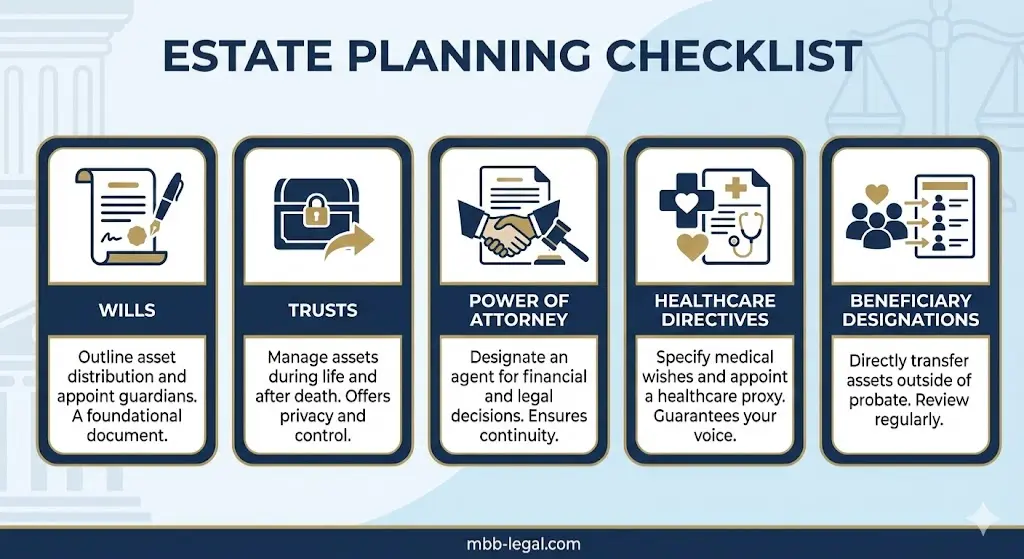
Estate planning isn’t only for those with huge properties. Your estate includes everything you own, from your car to real estate, jewelry, and money stored in your savings, checking, and retirement accounts. Since you cannot take these things with you when you die, you probably want to control how things are distributed among the people or organizations you care about the most.
To ensure the execution of your desired distribution, it is essential to create clear instructions specifying the recipients of your assets, defining the nature of what you wish them to inherit, and deciding the timeline for such transfers. That’s what estate planning is. In this blog, we will discuss estate planning, the types of assets that come under it, and how an estate attorney near you can help.
Overview of Estate Planning EssentialsEstate planning is a critical process that allows individuals to control the distribution of their assets after death, regardless of their wealth status. It encompasses all property, including real estate, financial accounts, digital assets, and personal belongings. The process relies on essential legal documents such as wills, trusts, and letters of intent to outline specific wishes and appoint guardians for minor children. Engaging an estate attorney ensures these documents are legally sound, tax-efficient, and customized to unique family needs. Ultimately, a well-structured estate plan prevents family disputes, avoids lengthy court delays, and provides financial security for beneficiaries, ensuring your legacy is handled exactly as you intend. |
Understanding Types of Assets Included in Estate Planning
Here’s a breakdown of various assets commonly considered in estate planning:
Real Estate:
Include all properties you own, such as homes, land, or commercial buildings, in your estate plan. Address any outstanding mortgages and consider the financial implications for your heirs.
Financial Assets:
List all financial accounts, including checking, savings, and money market accounts. Identify investment accounts, stocks, bonds, and mutual funds.
Retirement Accounts:
Include details of your IRAs, 401(k)s, and other retirement accounts.
Life Insurance Policies:
Clearly outline the details of your life insurance policies, including the policy amount and beneficiaries.
Business Interests:
If you own a business, outline your business interests and provide a succession plan.
Personal Property:
Consider sentimental items, collectibles, jewelry, vehicles, and other personal belongings.
Other Intangible Assets:
Consider intangible assets like patents, copyrights, trademarks, and any other intellectual property you may own.
Debts and Liabilities:
List any outstanding debts, loans, or lines of credit to provide a clear picture of your financial obligations. Specify how these debts should be handled, whether through estate funds or specific assets.
If you have doubts about the documents, it is better to hire an attorney for estate planning.

What Documents Do You Need for Estate Planning?
Will and Trust:
Will: A last will and testament is a legal document that outlines how you want your assets distributed after your death. It also appoints an executor to carry out these wishes. Wills are crucial for individuals of all asset levels and those with minor children, as they allow you to specify guardianship preferences. Consulting with an attorney for wills near you can provide valuable guidance to ensure your document is legally sound and accurately reflects your intentions.
Trust: A trust is a legal entity that holds assets on behalf of beneficiaries. It can be revocable or irrevocable, providing flexibility and control over asset distribution. Trusts are particularly useful in maintaining privacy and managing complex financial situations, such as large estates or business ownership. We have experienced trust attorneys near you who can help design a trust custom-made to your specific circumstances. If you are a resident of the Lone Star State, there are specific nuances to estate planning in Texas regarding trusts that you should be aware of.
Letter of Intent:
While not legally binding, a letter of intent provides additional guidance to your executor or beneficiaries. It can include specific wishes for certain assets, funeral arrangements, and other personal preferences.
Insurance Products:
Long-term care insurance, lifetime annuities, and life insurance play crucial roles in financial planning. Long-term care insurance helps cover expenses in old age, annuities provide a source of income until death, and life insurance facilitates the transfer of funds to beneficiaries without probate.
Proof of Identity Documents:
Keeping important identity documents, such as Social Security cards and birth, marriage, and divorce certificates, ensures a smooth estate settlement process. These documents help establish your identity and marital status.
Titles and Property Deeds are essential components of effective estate planning, each serving distinct purposes in securing your assets:
Titles:
The title refers to the legal ownership rights and interests in a property. It is the concept of ownership itself, encompassing the right to possess, use, and transfer the property. It can be transferred through a property deed. A clear title indicates that there are no outstanding legal claims or issues regarding ownership. Title searches are conducted to ensure that the seller has the legal right to transfer ownership and that the buyer will receive a clear and marketable title.
Property Deeds:
Property deeds are legal documents that transfer ownership of real estate. When engaging in estate planning, it’s crucial to have clear and accurate property deeds. Opting for a revocable living trust provides a strategic advantage in this regard.
Digital Assets Logins and Passwords:
In the digital age, managing digital assets is essential. Keeping track of account logins and passwords aids your digital executor in handling online accounts, social media, and other digital assets according to your wishes.
Everyone needs an estate plan, let’s build yours together!
How Can an Estate Law Attorney Near You Can Help?
Protection of Beneficiaries
An estate planning attorney significantly benefits beneficiaries by establishing a structured and efficient process for asset distribution. Clear instructions and legal documentation minimize the risk of family disputes, ensuring a seamless and timely transfer of inherited wealth. Through the use of trusts and other planning tools, estate planning provides asset protection, ensuring beneficiaries are not excluded from benefits and receive the properties designated to them. Thus providing financial security, offering peace of mind, and preventing the emotional and financial burden on heirs.
Care for Young Children
A will is essential for naming guardians if you are a minor’s parent. Without this provision, the courts will determine who will raise your children in the unfortunate event that both parents pass away before the children turn 18.
Tax Efficiency
Utilizing tools like the unified federal estate and gift tax exemption while and for estate planning helps shield a substantial portion of the estate from federal taxes. Trusts, like the Irrevocable Life Insurance Trust (ILIT), can further minimize tax liabilities. Additionally, distributing assets strategically over time, rather than in a lump sum, can remove or reduce income tax implications for beneficiaries.
Avoiding Family Conflicts
Estate planning mitigates family conflicts by establishing clear directives and legal documentation regarding asset distribution. Through wills, trusts, and beneficiary designations, owners articulate their intentions, leaving room for interpretation.
Individualized Plans
An estate attorney near you can assist with making personalized arrangements, such as creating trusts for specific beneficiaries or setting up provisions for children with health problems. That means you can make decisions based on individual circumstances, with a fair and just distribution of assets.
Timely Asset Transfer
Without a comprehensive estate plan, your heirs might have to waste a lot of time in courts and with the other family members, which may even lead to disputes among them, further leading to delays and additional expenses.
Identifying Key Players
Estate planning involves appointing key individuals for various roles, such as healthcare and property powers of attorney, guardians for children, and trustees or executors. All of this will help in the smooth execution of your estate plan.
Putting You in Control
You can take control of what happens to your assets, avoiding the default plans imposed by the state with the help of estate planning.
Conclusion
Now, you must have realized what potential issues may arise after you’re gone. And how estate planning can help manage a lot of them.
To know about the cost of estate planning and for guidance and assistance in San Antonio or New Braunfels, trust in the proficiency of our estate law attorneys near you at Mazurek, Belden & Burke, P.C.
Frequently Asked Questions
Is estate planning only for wealthy people?
No. Estate planning is for anyone who has assets, such as a car, a bank account, or personal belongings. It is also the only way to appoint a guardian for minor children, making it vital for parents regardless of their net worth.
What is the difference between a will and a trust?
A will goes into effect only after you die and typically goes through the public probate court process. A trust can go into effect while you are alive and allows assets to pass to beneficiaries privately and often faster, bypassing probate.
What happens if I die without an estate plan?
If you die without a plan (intestate), the state’s laws determine who inherits your assets and who becomes the guardian of your children. This “default plan” may not align with your actual wishes.
Can I include my digital assets in my estate plan?
Yes. Digital assets like social media accounts, cryptocurrency, and online photo libraries should be included. You should provide a secure way for your executor to access login credentials to manage or close these accounts.
